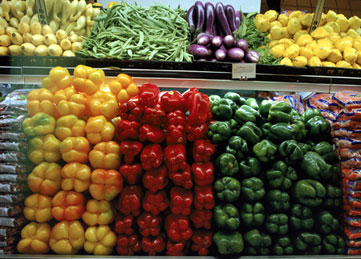As I was looking through my grocery store sale flyer earlier today [yes, I’m a swingin’, party dude!], it occurred to me that I apparently shop at a religious grocery store. By “religious grocery store”, I don’t mean that the canned yams have been anointed with oil or that the cabbages have been blessed by the pope. Rather, I mean there’s a religion (of sorts) that has to be followed – down to the tiniest detail – in order to have even a remote chance of buying an item at its advertised sale price.
For example, instead of giving the straight up cost of a single item, they’ll usually give the price in some kind of “easy to calculate” multiple such as: 7 items for $22.99! Then, in slightly smaller print, they’ll inform you that purchases of less than 7 items or greater than 7 items will be charged $6 per item (so you’d better not miscount by even one item or you’ll pay double).
However, before the 7 items for $22.99 “sale” is even valid, you must buy 10 other qualifying products. As can be expected, if you accidentally buy only 9 “qualifying products” then you’ll be stuck for full price on the 7 for $22.99 bargain. Sometimes they’ll even limit the “deal” to a limited number of days during the week (Tuesday-Thursday, for instance). I’m just waiting to see them advertise a sale occurring “Only on even numbered Tuesdays, in months containing 30 days, between the summer solstice and autumnal equinox”.
As if all that weren’t enough, they’ll also add, in the tiniest of print, that “the advertised sale is subject to availability, may not be valid in every store, and that other terms & conditions may apply”.
So, in order to take advantage of this “great bargain”, you have to be able to calculate a deliberately uneven quantity-to-price ratio. Then you have to make sure that you get the exact advertised number of items. You also have to see & understand that the whole discount price is predicated on you purchasing 10 other qualifying items (and coming up even one item shorts nullifies the whole deal). Of course, you also have to make sure that these transactions take place on the properly designated day. But, even if you somehow manage to clear all those hurdles, the grocery chain can’t guarantee that everyone will be able to take advantage of the sale price due to limited availability or other unforeseen circumstances. In other words, the system is rigged to maximize failure and minimize (or even eliminate) reward.
That is exactly how religion operates! There are always rules, with more-&-more rules buried underneath. If you slip up on any rule, then the entire “deal” is off. Even if you somehow manage to follow the rules, the promised rewards are predicated on you doing something else first, and doing it flawlessly. Of course, all this must be done in certain ways, at certain times and in certain places – praying a specific number of times each day, giving away a set amount of money, worshipping in a particular building – or, once again, the offer of reward becomes “null & void”. And even if you do (unbelievably) manage to clear all these “religious hurdles”, there are still other “terms & conditions” that may apply which could deny you of your eternal reward down the road.
Christianity stands – or should stand – in stark contrast to religion. Tragically, Christianity, all-too-often, has been practiced like it’s a religion, but it’s actually quite the opposite. Religion sets up rules & systems – full of traps, pitfalls & loopholes – and tells its followers that they must work & struggle to make it through all the “terms & conditions” so that they can (hopefully) earn the reward that the religion promises (“though some exclusions may apply”). Christianity, on the other hand, says that we don’t earn our reward by meticulously following obscure rules (or anything else). Jesus Christ has already perfectly fulfilled all the “terms & conditions”, disabling the traps & pitfalls, so that there’s no longer any loopholes or technicalities to keep us from receiving our eternal reward. Christians don’t follow rules as a means to reward. We follow Jesus – who is our reward – the one who saved us from religion (and other dead end paths).
Eron Elswick
Worship – Grow – Serve


Kind of off topic… where are the podcasts posted?